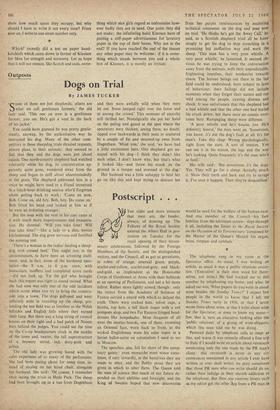0 u tposts
Dogs on Trial
By JAMES TUCKER ,omE of them are just shepherds; others are S what we call gentlemen farmers,' the old lady said. 'This one on now is a gentleman farmer, you see. He's got a vent in the back of his jacket.'
You could have guessed he was pretty gentle- manly, anyway, by the authoritative way he instructed his dog. Many of, the other com- petitors in these sheepdog trials shouted requests, almost pleas, to their animals: they seemed to feel that they and the dogs were just about equals. One north-country shepherd bad watched tolerantly while his dog, its concentration ap- parently quite gone, wandered away from the sheep and began to sniff about absentmindedly in the grass. The shepherd addressed him in a voice he might have used to a friend immersed in a lunch-hour drinking session who'd forgotten about getting back to work : 'Come on now, Bob. Come on, old boy. Bob, boy. Do come on.' Bob lifted his bead and looked at him as if he were an irritating stranger.
But the man with the vent in his coat came at it with much more imperjousness and exaspera- tion. He shouted: 'Will you take time! Will you take time!'—like a lady to a dim, novice kitchenmaid. The dog grew nervous and fumbled the penning test.
'There's a woman in the ladies' feeding a sheep- dog with corned beef.' This ought not, in the circumstances, to have been an arresting state- ment; and, in fact, some of the hardened spec- tators—the 9 a.m. to 6 p.m. crew, with binoculars, mufflers and completed score cards —did not look up. Yet the girl who brought back this report was right to sound moved. What she had seen was only one of the odd incidents which occur when you try to bring the country- side into a town. The dogs galloped and went infinitely wide in rounding up the sheep, pre- tending the test field was as limitless as the Welsh hillsides and English fells where they earned their keep. But there was a long string of council houses on their right and a bad patch of Nissen huts behind the judges. You could see the time on the Co-op headquarters clock in the middle of the town and, nearer, the tall superstructure of a brewery stood, sad, dirty-pink and urban.
The old lady was growing bored with the calm expertness of so many of the performers. She had been pacing about for some time, in- stead of staying on her hired chair, alongside her husband. She said: 'Of course, I remember once seeing the trials in Hyde Park. The sheep had been brought up in a van from Dagenham and they were awfully wild when they were let out. Some jumped right over the fence and in among the crowd.' This moment of anarchy still thrilled her. Nostalgically she put her hand on the paling and gazed at the spot where the spectators were thickest, seeing them, no doubt, tipped over backwards in their seats or scattered by a couple of fat and steamed-up ewes from Dagenham. 'Mind you,' she said, 'we have had a little excitement here. One shepherd got an- noyed with his dog—I think they didn't like each othpr, I don't know why, but that's what it looked like—and threw his crook on the ground in a temper and stormed at the dog.'
Her husband was a little unhappy to hear her go on like this and kept trying to distract her from her purple reminiscences by muttering technical comments on the dog and man now on trial. 'He thinks he's got the Away Call,' he said, as a Scottish shepherd tried all he knew simply to get his dog to stop crouching in a promising but ineffective way and work the sheep. 'This man has a very poor whistle. A very poor whistle,' he lamented. It seemed ob- vious he was trying to keep the conversation away from the animals, with their unpredictable, frightening impulses, their tendencies towards chaos. The human beings out there in the test field could be understood, were subject to laws of behaviour; their failings did not include moments when they forgot their nature and ran wild among the people, causing distress and shock. It was unfortunate that this shepherd had a bad whistle and that the other one had hurled his crook down; but there were no cosmic over- tones here. Rampaging sheep were different.
'A poor whistle and he's hoarse, too. He's definitely hoarse,' the man went on. 'Sometimes, you know, it's not the dog's fault at all. It's the man's. Take this chap Wrong psychologically, right from the start. A sort of tension. You can see it in his stance, the legs and the way he's looking. Quite frequently it's the man who's at fault.'
His wife said : 'But sometimes it's the dog.• Yes. They will go for a sheep. Actually attack it Show their teeth and bark and try to savage it.,I've seen it happen. Then they're disqualified.'






















































 Previous page
Previous page